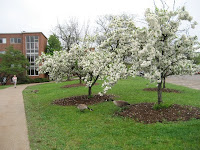Dear Friends and Members,
At this year's International Medieval Congress at Western Michigan University (May 12-15, Kalamazoo, Michigan),
Medica joins forces with
AVISTA: The Association Villard de Honnecourt for the Interdisciplinary Study of Medieval Technology, Science, and Art to present the following 4 sessions devoted to examining
The Sacred and the Secular in Medieval Healing (SSMH):
Thursday 10 a.m. - Bernhard Brown & Gold Room(Session 47) SSMH I: Images and ObjectsOrganizers: Barbara S. Bowers (Ohio State Univ.) and Linda Migl Keyser (Univ. of Maryland)
Presider: Carol Neuman de Vegvar (Ohio Wesleyan Univ.)
Cure for the Common Common: Images and Objects Used by the Lower Classes for Healing, Protecting and WorshipSarah Blick (Kenyon College)
Loadstones are a Girl's Best Friend: Lapidary Cures, Midwives, and Manuals of Popular Healing in Medieval and Early Modern EnglandNichola E. Harris (SUNY-Ulster)
Early Medieval Crystal Amulets: Secular Instruments of Protection and HealingGenervra Kornbluth (Kornbluth Photography)
Thursday 1:30 p.m. - Bernhard Brown & Gold Room(Session 93) SSMH II: SitesOrganizers: Barbara S. Bowers (Ohio State Univ.) and Linda Migl Keyser (Univ. of Maryland)
Presider: Iona McCleery (Univ. of Leeds)
The Hospital Chapel at Tonnerre: Altars, Liturgy, and RelicsLynn T. Courtenay (Univ. of Wisconsin - Whitewater and Madison)
Performative Thaumaturgy: The State of Research on Curative and Spiritual Interaction at Medieval Pilgrimage ShrinesJim Bugslag (Univ. of Manitoba)
Life Insurance in the Medieval Period: Insights Offered by the Distribution of Pilgrims' Badges Recently Found in EnglandMichael Lewis (British Museum)
Thursday 3:30 p.m. - Bernhard Brown & Gold Room(Session 140) SSMH III: Vernacular TextsOrganizers: Linda Migl Keyser (Univ. of Maryland) and Barbara S. Bowers (Ohio State Univ.)
Presider: Linda Migl Keyser (Univ. of Maryland)
Speaking Physic in Late Medieval EnglandJulie Orlemanski (Humanities Center, Harvard Univ.)
Middle Dutch Women's Secrets in a Courtly ContextOrlanda S.H. Lie (Univ. Utrecht)
Humans, Animals, and Veterinary Medicine in the Middle AgesWilliam H. York (Portland State University)
Thursday 7:30 p.m. - Bernhard Brown & Gold Room(Session 170) SSMH IV: Texts, Plagues, and Religious HealingOrganizers: Linda Migl Keyser (Univ. of Maryland) and Barbara S. Bowers (Ohio State Univ.)
Presider: William H. York (Portland State University)
Plague in Bede's Prose Life of CuthbertMichelle Ziegler (St. Louis Univ.)
Religious and Medical Interpretations of Pestilence in the Late Middle AgesOtto Gecser (Eotvos Lorand Univ./Central European Univ.)
Hope and Heat: Secular Medicine and Human Faith in Two Late Medieval Resurrection MiraclesLeigh Ann Craig (Virigina Commonwealth Univ.)
Also note that Medica's annual
Business Meeting will convene on
Thursday at 12:00 noon in the Bernhard Brown & Gold Room. We'll be discussing plans for future Medica sessions at Kalamazoo and Leeds, as well as plans for growing the society. All are welcome; bring a lunch and a friend. This is an open meeting for members and anyone interested in researching illness and healing in the Middle Ages.
The full program for the conference can be accessed at
www.wmich.edu/medieval/congress/index.html.
Come join the fun. See you in May,
Linda Migl Keyser
Medica, President




